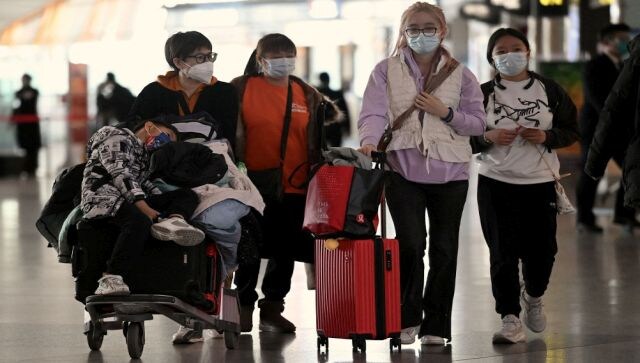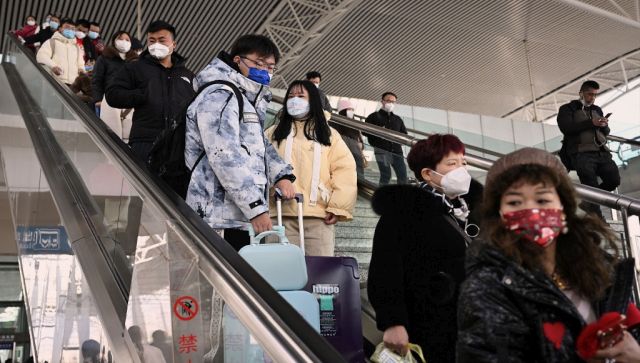On Sunday, China will reopen its borders to Hong Kong, almost three years after COVID-19-related curbs isolated the financial hub from the mainland. It will also drop quarantine rules for international passengers but leisure tourists are not yet allowed entry

Incoming travellers to China would no longer have to quarantine from 8 January, the latest major reversal of strict restrictions that have kept the country largely closed off to the world since the start of the pandemic. AFP
For close to three years, it was cut off from the world. Now China has decided to reopen even as the country battles with a surge of COVID-19 infections.
Come 8 January, China will open its borders to Hong Kong. It will also lift pandemic-induced restrictions including quarantine for passengers travelling from abroad. For a country, which was abiding by a strict zero-COVID policy until early December, this is a big change. So can all travellers visit China now? What changes for Hong Kongers? Will there be any other rules to abide by? We take a look.
What will change as borders with Hong Kong open?
On Sunday, China will open borders with Hong Kong, ending three years of restrictions that left the financial hub isolated from the mainland. There will be no mandatory quarantine for travellers from Hong Kong and they will not have to undergo a COVID-19 test on arrival. However, they are required to carry a negative test taken within 48 hours before travelling.
China will also resume travel and business visas for mainland residents to visit Hong Kong.
However, there is a restriction on the number of travellers. Hong Kong has set a limit of 60,000 people allowed to travel to the mainland every day.
The high-speed rail link between Hong Kong and the mainland will resume no later than 15 January. Ferry services between Hong Kong and Macau and the financial hub and the mainland will restart, according to a report on Bloomberg.
The ease of travel restrictions will provide a big boost to Hong Kong, which is a gateway between China and the world. Its economy took a hit after it was cut off from China, its biggest trading partner, the report says.

Chinese will reopen its border with Hong Kong on 8 January, close to three years after it was shut to contain the spread of COVID-19. AFP
What about international travellers?
As China began to ease zero-COVID restrictions, it scrapped curbs on international flights at the beginning of November. It abandoned the “circuit breaker” policy, where Chinese aviation officials arbitrarily suspend international flights for a prolonged period if any passengers tested positive for COVID-19 upon arrival.
But there was compulsory quarantine for international passengers. Inbound travellers to China are required to spend five days in mandatory quarantine in a government-supervised facility followed by three days of home isolation. However, from Sunday, compulsory quarantine will be stopped.
So can holidayers visit China?
Not yet. Leisure tourists are not yet allowed in the country. Borders are open only to those on business or family visits. The country is processing visas for foreign nationals who are travelling for business, employment, study, family visits and reunions.
While China has hinted at easing restrictions related to tourism no timeline has been announced yet.
In 2019, China was among the top tourist destinations around the world. The number of tourists to China in the first three quarters of the year stood at 108.76 million, up 4.7 per cent from 2018.
George Cao, CEO of Dragon Trail International, a China-focused marketing and research company, told CNN Travel, “It’s also crucial for the international flight schedule to increase, which will make it easier to get to China and also bring down flight prices, which are still well above pre-pandemic levels.”

While China has eased restrictions, its borders will remain close to leisure tourists. AFP
Are there no checks for travellers?
While travellers need a negative result, they do not have to apply for a “green health code” from Chinese embassies and consulates before entering the country. But they have to fill in a customs declaration form with the results.
However, those who test positive cannot travel to China.
There is a check-up on arrival. According to the country’s National Health Commission, as long as the health declarations are normal and inbound travellers show no signs of illness in a “routine check-up” when clearing customs, no special restrictions will be imposed on them in the country, reports Nikkei Asia.
What about masks and social distancing?
Social distancing and masks are not mandatory in China. But those who visit public places or use public transport are likely to be asked to put on a face mask, CNN Travel reports.
How safe is it to visit China?
China is seeing a surge in cases with some experts saying that the country could witness two million deaths as its population lacks immunity and poor vaccine coverage among the elderly. However, China has reported only a handful of deaths.
Hospitals are overcrowded, crematoriums are overflowing, and last week, a shortage of medicines was reported.
Also read: Explained: How desperate Chinese are illegally procuring India-made meds amid COVID scare
The country’s COVID-19 data is not giving an accurate picture of the situation there and underrepresents the number of hospitalisations and deaths from the disease, a senior official at the World Health Organization said.
“We believe the current numbers being published from China underrepresent the true impact of the disease in terms of hospital admissions, in terms of ICU admissions, particularly in terms of death,” said Mike Ryan, WHO’s emergencies director.
Comments
Post a Comment